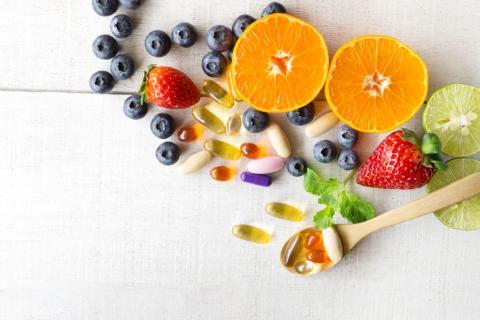
If you've broken a bone, you know how distressing it can be. No doubt you want to return to your normal activities as quickly as possible. Are there any holistic ways to help a broken bone along?
While time remains the best healer for fractures, adopting certain healthy habits can speed up the recovery process. The following six tips may help you get back in the game as soon as possible.
1. Up Your Supplements
Your body needs nutrients to heal. And when you have a fracture, you need a heftier dose of certain vitamins and minerals to accelerate your recovery. While you do well to talk to your doctor before beginning any supplement regimen, here are some to consider.
- Calcium. Your bones consist of a lot of calcium and deficiencies in this mineral can slow healing. It can also leave you prone to future breaks. Strive to eat at least 1,000-1,200 milligrams of calcium daily. If you follow a vegan lifestyle, you can find calcium in amaranth, broccoli, and deep, leafy greens as well as in almonds. Almond milk makes a good substitute for regular milk if you avoid dairy.
- Vitamin D. Your body cannot absorb calcium without vitamin D. Fortunately, your body can make adequate amounts of this nutrient with regular exposure to sunlight. Strive to get outdoors daily for at least 15 minutes without sunscreen to improve vitamin D production.
- Vitamin A. People with deficiencies in vitamin A are more likely to suffer osteoporosis and fractures. Foods high in vitamin A include carrots, kale, and sweet potatoes.
- Iron. Lack of sufficient iron intake causes anemia, which leads to thinning hair and nails and fatigue. When you're low in iron, the blood lacks sufficient oxygen to carry to body tissues, including your bones. If you follow a vegetarian or vegan diet, talk to your doctor about taking an iron supplement.
Keep in mind some supplements, such as calcium, can hinder the absorption of certain medications. For example, if you suffer hypothyroidism, taking calcium at the same time as your pill can prevent the medication from absorbing.
2. Adopt A Healthier Diet
Switching to a healthy, primarily plant-based diet can accelerate bone healing. The right diet prevents nutritional deficiencies and hormonal disruptions that can hinder recovery.
At each meal, strive to fill half your plate with fruits and vegetables. Aim to consume a variety of colors—different plant colors represent unique phytonutrient profiles. Take a pass on processed foods, as these lose their nutritional value during the manufacturing process. If you choose to eat red meat, aim to do so no more than once or twice weekly—consuming as little as 18 ounces of red meat weekly increases your risk of colorectal cancer.
3. Talk To Your Doctor About Medications
Certain medications can impede bone healing. For example, those who take long-term doses of certain cortisone-like medications such as prednisone can suffer weakened bones. So can those on high doses of certain thyroid medications and antidepressants.
Check with your doctor to see if any of your current medications can hinder your healing. If so, ask if alternative therapies exist, at least over the short term, while you recover.
4. Explore Complementary Therapies
Some practitioners swear by therapies such as acupuncture to speed bone healing. Similarly, certain herbs show promise in promoting proper hormonal balanceto speed recovery. Higher testosterone levels, for example, spur faster bone healing.
Devices such as TENS units send electrical stimulus to muscle fibers to aid in relaxation. Western scientists believe acupuncture works by activating certain nerve fibers as the practitioner manipulates the needles. As inflammation leads to increased pain, any techniques that can reduce this naturally will prove palliative even if their efficacy remains unsubstantiated to date.
5. Cut Back On Toxic Habits
Tobacco use reduces the blood supply to your bones, making them more porous and prone to fracture. Additionally, smoking inhibits the bones' ability to absorb calcium, requisite for healing.
Alcohol also inhibits calcium absorption by interfering with pancreatic function. Alcohol impairs liver function as well. The liver activates vitamin D, without which the body cannot absorb this vital mineral.
6. Keep It Immobile
Finally, the best way to heal a broken bone quickly is keeping it immobile. If you have a cast, this proves easier, but follow your doctors' instructions when it comes to using aids such as crutches. Smaller breaks, such as broken fingers or toes, often don't require a cast. You can buddy-tape your injured digit to a neighboring one to keep it still as it heals.
Broken bones interfere with daily activities and leave you on the sidelines. While you can't prevent all injuries, by following a few simple tips, you may be able to speed up your return to play.








